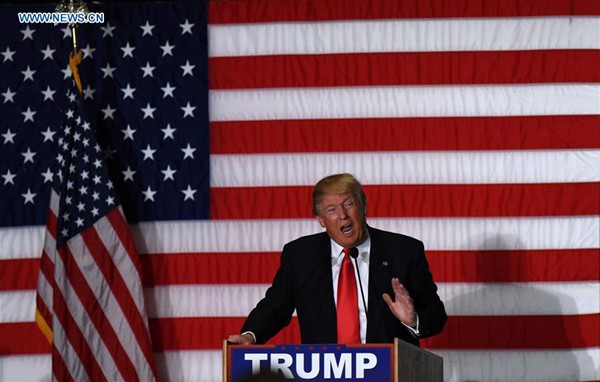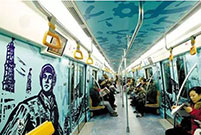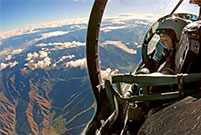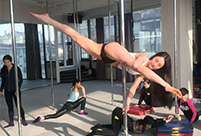

 |
| Republican presidential candidate Donald Trump speaks at a campaign rally in Cedar Rapids, Iowa, the United States, Feb. 1, 2016. (Xinhua/Yin Bogu) |
NASHUA, United States, Feb. 10 (Xinhua) -- As Republican Donald Trump and Democrat Bernie Sanders surged Tuesday to their victories in the New Hampshire primary, the second presidential contest in the U.S., voters are still unsure about their positions on economic issues, which are so far sidelined in the debates.
During the New Hampshire campaign, tons of questions were thrown to the candidates at the town hall meetings in the "Granite State" on a string of issues from anti-terrorism to gun control, while discussions about the economy was largely missing.
The same thing happened at the televised presidential debates.
This is in stark contrast with what happened four or eight years ago when economic issues dominated the campaign amid the worst financial crisis in decades.
Eight years on, the U.S. unemployment rate fell to 4.9 percent, less than half of its peak during the crisis. The economic output grew 2.4 percent in 2015, quite remarkable among advanced economies.
After the bullish job data was released last Friday, President Barack Obamaseized the opportunity and touted the United States has right now the strongest and the most durable economy in the world.
"The economy is doing reasonably well, although not spectacularly well," said Joseph Gagnon of the Peterson Institute for International Economics, a Washington-based think-tank.
"So it's good enough for Republicans not to have an angle of attack, but it's not so good as Democrats can brag about it," he added.
Ted Luszey, who lives in Hudson town of New Hampshire for decades, said he did not find lives getting easier though the job data is improving.
"My daughter has a business degree, but she has to do three jobs to keep her lower middle class life. I had the same degree as hers, but my life was much easier when I was at her age," he said.
Marty Ellsworth, born and raised in Georgetown of Washington DC, is a part-time salesman at a Ralph Lauren clothing store near his home.
"It's easy to find a job like waiters and bar tenders, but a better-paying work will be difficult to find if without a degree," he said.
When the labor market seems near "full employment", it could point to higher wages and rising inflation.
However, for years U.S. wage earners have barely seen their incomes grow, while inflation is far below the Federal Reserve's two percent target.
Economists at Standard &Poor said, taken the broader unemployment measures into account as they called it "U-6", which includes the official unemployed, discouraged workers and part-timers who'd like full-time jobs, the unemployment rate is 9.9 percent now.
Democratic candidate Bernie Sanders also argued that the real unemployment rate for Americans is over ten percent if people forced to work part time were counted as the unemployed.
To tackle the stagnant wage increase and the still underutilized job market, Democratic candidates turn to raising minimum wage and cutting taxes for the working middle class.
Republican candidates vow to improve international trade deals and bring the outsourced jobs back to America. However, they have not offered any detailed plans except for sketches and slogans.
Barry Bosworth, researcher with the Brookings Institution, another Washington-based think tank, said it may take several more weeks or months for real proposals on the economy to emerge.
"Neither party has any great suggestions on how to deal with the issues of employment and income growth that seem to be the dominant economic concerns of voters," he said.
If wages don't begin to budge, economists expect voters who aspire to become middle class may cast their ballots for the candidate with the most feasible income growth plans.
Days before the New Hampshire primary kicked off, economists at JP Morgan warned that the recession risk in the U.S. is rising rapidly despite the rosy pictures that the Federal government is outlining.
Stalling labor productivity, plummeting crude oil prices and a stronger U.S. dollar are weighing on corporate profitability. That could lead to a greater likelihood of sharp economic slowdown in the quarters ahead, they said.
Other investment banks even issued more aggressive warnings of recession risks.
Gideon Dunkley, a retired university administrator who lives on a comfortable pension plan, said he believed Donald Trump would be the best candidate to take care of the economy.
"He is a raw businessman and he knows how the economy functions. But to take care of the U.S. economy, he has to walk between both sides of the aisle. But it seems he is not good at it," he noted.
 Have you ever taken these beautiful subways in China?
Have you ever taken these beautiful subways in China? Chinese beauties, foreign models meet in Chengdu
Chinese beauties, foreign models meet in Chengdu Awesome! Aerial pictures taken on J-11 fighter
Awesome! Aerial pictures taken on J-11 fighter A foreign girl explains what China should be proud of
A foreign girl explains what China should be proud of Chinese navy's air-cushioned landing craft in pictures
Chinese navy's air-cushioned landing craft in pictures Chinese pole dancing master opens class in Tianjin
Chinese pole dancing master opens class in Tianjin Splendid Sichuan after snow
Splendid Sichuan after snow College girl of Vancouver crowned Miss Chinese Int'l 2016
College girl of Vancouver crowned Miss Chinese Int'l 2016 Pentagonal Mart becomes the largest vacant building in Shanghai
Pentagonal Mart becomes the largest vacant building in Shanghai Top 20 hottest women in the world in 2014
Top 20 hottest women in the world in 2014 Top 10 hardest languages to learn
Top 10 hardest languages to learn 10 Chinese female stars with most beautiful faces
10 Chinese female stars with most beautiful faces China’s Top 10 Unique Bridges, Highways and Roads
China’s Top 10 Unique Bridges, Highways and Roads After spate of espionage allegations, US law firm opens first China office
After spate of espionage allegations, US law firm opens first China office Author Feng Tang attacks decision to pull book from shelves
Author Feng Tang attacks decision to pull book from shelves Going ape for New Year
Going ape for New Year Black lungs
Black lungsDay|Week